View in other NatureServe Network Field Guides
NatureServe
Montana
Utah
Wyoming
Idaho
Wisconsin
British Columbia
South Carolina
Yukon
California
New York
Pine Violet - Viola purpurea
Native Species
Global Rank:
G5
State Rank:
S3S4
(see State Rank Reason below)
C-value:
Agency Status
USFWS:
USFS:
BLM:
External Links
State Rank Reason (see State Rank above)
Viola purpurea occurs in the southwest and south-central portions of Montana, which is at the edge of its distribution in the western United States (FNA 2015). Plants grow in gravelly soils of meadows, grasslands, and exposed slopes from the montane to subalpine zones. Since 1899 many populations have been documented, but observation data is getting old. Habitat appears to be stable and not a limiting factor. Threats have not been identified. Current information on population locations and sizes, threats, and habitat requirements is needed to better assess its status.
- Details on Status Ranking and Review
Range Extent
ScoreF - 20,000-200,000 sq km (~8,000-80,000 sq mi)
Comment58,690 square kilometers
Area of Occupancy
ScoreE - 26-125 4-km2 grid cells
CommentPlant occurs in 34 of the 30,590 4x4 square-kilometer grid cells that cover Montana.
Number of Populations
ScoreC - 21 - 80
Comment38 observations representing 37 occurrences
Threats
ScoreD - Low
General Description
Rhizomatous, puberulent. Stems 1–3 cm, mostly subterranean. Leaf blades 5–20 mm wide, lanceolate to ovate, thick, purple-tinged, shallowly lobed; stipules lanceolate. Flowers yellow, 7–12 mm long; petals with brown lines; the lateral pair bearded; spur 1–2 mm long; style tip hairy. Capsule puberulent; 4–5 mm long (
Lesica et al. 2012. Manual of Montana Vascular Plants. BRIT Press. Fort Worth, TX).
Our plants are variety
venosa (S.Watson) Brainerd.
Species Range
Montana Range
Range Descriptions
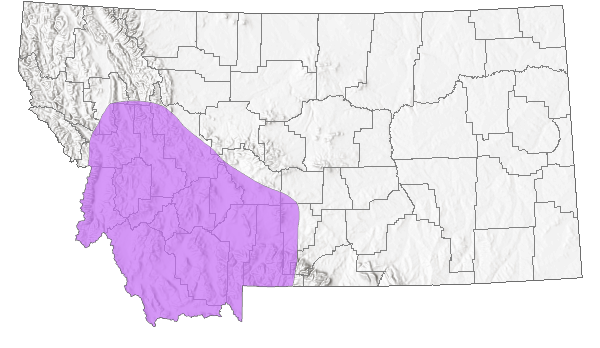
 Native
Native
Range Comments
WA to MT south to CA, AZ and CO (Lesica et al. 2012. Manual of Montana Vascular Plants. BRIT Press. Fort Worth, TX).
Observations in Montana Natural Heritage Program Database
Number of Observations: 50
(Click on the following maps and charts to see full sized version)
Map Help and Descriptions
Relative Density
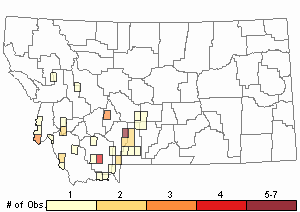
Recency
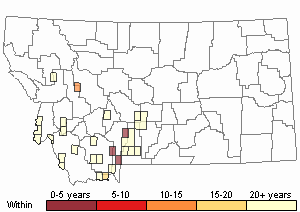
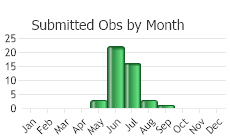
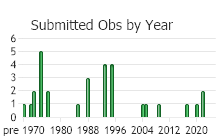
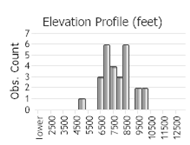 (Observations spanning multiple months or years are excluded from time charts)
(Observations spanning multiple months or years are excluded from time charts)
Habitat
Ecology
POLLINATORS The following animal species have been reported as pollinators of this plant species or its genus where their geographic ranges overlap:
Bombus vagans,
Bombus pensylvanicus,
Bombus bimaculatus,
Bombus griseocollis, and
Bombus impatiens (Colla and Dumesh 2010, Williams et al. 2014).
Stewardship Responsibility
References
- Literature Cited AboveLegend:
 View Online Publication
View Online Publication Colla, S.R. and S. Dumesh. 2010. The bumble bees of southern Ontario: notes on natural history and distribution. Journal of the Entomological Society of Ontario 141:39-68.
Colla, S.R. and S. Dumesh. 2010. The bumble bees of southern Ontario: notes on natural history and distribution. Journal of the Entomological Society of Ontario 141:39-68. Lesica, P., M.T. Lavin, and P.F. Stickney. 2012. Manual of Montana Vascular Plants. Fort Worth, TX: BRIT Press. viii + 771 p.
Lesica, P., M.T. Lavin, and P.F. Stickney. 2012. Manual of Montana Vascular Plants. Fort Worth, TX: BRIT Press. viii + 771 p. Williams, P., R. Thorp, L. Richardson, and S. Colla. 2014. Bumble Bees of North America. Princeton, NJ: Princeton University Press. 208 p.
Williams, P., R. Thorp, L. Richardson, and S. Colla. 2014. Bumble Bees of North America. Princeton, NJ: Princeton University Press. 208 p.
- Additional ReferencesLegend:
 View Online Publication
View Online Publication
Do you know of a citation we're missing? Culver, D.R. 1994. Floristic analysis of the Centennial Region, Montana. M.Sc. Thesis. Montana State University, Bozeman. 199 pp.
Culver, D.R. 1994. Floristic analysis of the Centennial Region, Montana. M.Sc. Thesis. Montana State University, Bozeman. 199 pp. Hawkins, P.H. 1903. The alpine flora of Montana. M.Sc. Thesis, Bozeman, MT: Montana State University. 24 pp.
Hawkins, P.H. 1903. The alpine flora of Montana. M.Sc. Thesis, Bozeman, MT: Montana State University. 24 pp. Jones, W. W. 1901. Preliminary flora of Gallatin County. M.S. Thesis. Bozeman, MT: Montana State College. 78 pp.
Jones, W. W. 1901. Preliminary flora of Gallatin County. M.S. Thesis. Bozeman, MT: Montana State College. 78 pp. Lesica, P., M.T. Lavin, and P.F. Stickney. 2022. Manual of Montana Vascular Plants, Second Edition. Fort Worth, TX: BRIT Press. viii + 779 p.
Lesica, P., M.T. Lavin, and P.F. Stickney. 2022. Manual of Montana Vascular Plants, Second Edition. Fort Worth, TX: BRIT Press. viii + 779 p.
- Web Search Engines for Articles on "Pine Violet"





